Merriam Webster dictionary defines the word “resilience” as “the ability to become strong, healthy, or successful again after something bad happens” or “the ability of something to return to its original shape after it has been pulled, stretched, pressed, bent, etc”. The latter definition specifically concerns objects, but from whatever Pakistan has undergone since its independence, it wouldn’t be wrong to say the state was also “stretched” i.e. over-stretched in handling security crises, “pressed” i.e. pressurized to “do more” and so on.
Since its inception on August 14, 1947, the State of Pakistan has continued to defy the odds. The magnitude and diversity of threats it faces (both internal and external) include a run-down economy, an alarming internal security situation on the apparent verge of a meltdown, dozens of insurgencies, foreign-sponsored separatist movements, politico-socio-ethnic fascism, religious bigotry and extremism and, to top it all off, a transcendent identity crisis. Although the founding fathers of the country laid out its vision in clear terms, two divergent schools of thought (one liberal and the other conservative) still lock horns on defining the country’s raison d’être according to their respective interpretations.
In the following instances, I am going to share selected excerpts from various publications with readers, along with a brief context to each; the objective of sharing these citations is to give readers a fair idea of how, despite frequent predictions of imminent dismemberment, the State of Pakistan continues to thrive and prosper. Without further ado, let’s analyze a few prominent examples:
2008
In an article for the New Statesman, published historian William Darlymple discussed Pakistan’s internal developments in the previous year, such as the operation on Lal Masjid, assassination of Benazir Bhutto, sacking of the Chief Justice by Gen (retd) Pervez Musharraf and other pressing issues. While describing the effects of such incidents on the state, Darlymple wrote:
“Pakistan is clearly not a country on the verge of civil war. Certainly it is a country at the crossroads, with huge economic and educational problems, hideous inequalities and serious unresolved questions about its future. There is much confusion and disillusion. There is also serious civil unrest, suicide bombings and an insurgency spilling out of the tribal areas on the Afghan border. But judging by the conversations I had, it is also a resilient country that now appears to recognise democracy as its best hope. On my recent travels I found an almost unanimous consensus that the mullahs should keep to their mosques and the military should return to their barracks, like their Indian counterpart. Much violence and unrest no doubt lie ahead. But Pakistan is not about to fall apart.”
2010
In his opening paragraph in an article for the East-West Institute, renowned Pakistani defence and security analyst Major (retd) Ikram Sehgal had this to say about his homeland:
“To paraphrase Mark Twain: “Rumours about Pakistan’s demise have been greatly exaggerated.” By any measure, the country has defied the odds, and we are one of the most resilient nations on earth. How many nations are capable of surviving the manmade and natural catastrophes that we are periodically subjected to, not counting the disaster that is our democratic leadership? Even incurable optimists like me do not cease to wonder at our inherent ability to rise from the ashes. Something like Razzak’s amazing century the other day in Abu Dhabi.”
2011
1. In a defiant article, renowned Pakistani blogger and analyst Riaz Haq comments on the disasters that struck Pakistan during the two preceding years 2009 and 2010. He begins his article with the following paragraph:
“Pakistanis are no strangers to the oft-repeated apocalyptic forecasts of imminent collapse of their nation that have been regularly dished out by many western leaders, leading analysts and mainstream media over the years. The 2009 Swat valley insurgency and 2010 summer floods sent these pessimist pundits in overdrive yet again as the images of the victims of these crises were widely distributed and discussed at length.”
While commenting on incidents which many hostile elements predicted would result in Pakistan’s destabilization, he summarizes the article in the following words:
“Pakistan continues to face major problems as it deals with the violent Taliban insurgency and multiple crises of stagnant economy, scarcity of energy and the lack of sense of security. The recent assassinations of the ruling PPP party leaders Salman Taseer and Shahbaz Bhatti are a reminder of the daunting challenge posed by the violent religious fanatics. The bumbling political leadership of Pakistan is incompetent and corrupt. However, what the prophets of doom and gloom often discount are key factors that keep the nation going, including the resilience of Pakistan’s people, the extraordinary capabilities of its large and growing urban middle class, and the stabilizing influence of its powerful military. Pakistan is just too big to fail. I fully expect Pakistan to survive the current crises, and then begin to thrive again in the near future.”
2. UAE’s English-language daily The National wrote an editorial on the threats to Pakistan from within. It highlighted the situation post Osama bin Laden’s killing, the dreadful attack on PNS Mehran naval airbase and the David Headley affair.
The editorial ended in the following words:
“Pakistan is a strong and resilient country, and there is every reason to believe that the rational side can win this struggle for the soul of state and society. Pakistan’s friends abroad can help, not with threats but with steady support.”
2012
1. In an interview to Radio Australia, prominent Indian journalist M.J. Akbar discussed why Pakistan, despite being a fragile country, is resilient. In fact, this was the central theme of his book ‘Tinderbox’. He presents arguments for why Pakistan should rid itself of the label of religion and become secular. Anyhow, his statement regarding Pakistan’s defiance of odds is what matters for us.
Some interesting excerpts from the interview are reproduced below:
JIM MIDDLETON: Washington has said more than once that the challenges facing Pakistan are so great that its very existence is at risk. You, on the other hand, have a sense it is more durable than that. Why, despite all the challenges, do you think its durability does guarantee its future?
M. J. AKBAR: Because I think Washington has got this one wrong. It is not Pakistan which will collapse. I’ve called it a jelly state. A jelly state is one which is quivering, unlike butter, it won’t melt and disappear. But because it has nuclear arms and because it has a fundamentalist core, it will be a toxic jelly state for the region and toxic for its own people. And I think there’s great awareness among middle-class Pakistan, among the aspiring urban Pakistan of the dangers there. But I think Washington doesn’t quite understand that there is a difference between the polity and the nation. The danger that emerges from Pakistan is the danger from its political evolution, not from its status as a nation-state.
Comment: Despite M.J. Akbar’s concerns related to extremism and religious intolerance in Pakistan, he intertwined the issues with the country’s security apparatus and international outlook; a view generally held by the common Indian citizen. His views on Pakistan’s military and political governments are known to all, but it is his belief that Pakistan will not collapse, as otherwise predicted by various groups. Akbar terms Pakistan a “jelly state” i.e. one which wobbles every now and then because of a barrage of conflicts and tensions but, miraculously, manages to re-emerge even before it turns into ashes. It should be taken as a compliment by the average Pakistani.
2. Renowned journalist Anatol Lieven visited Pakistan to discuss highlights of his book “Pakistan: A Hard Country”. He is a professor of International Relations and Terrorism Studies at King’s College, London and a Senior Researcher at the New America Foundation. In a report for DAWN, Peerzada Salman discusses his talk at the Oxford University Head Office, Karachi in the following words:
“He (Lieven) began by asserting that Pakistan was not a failed state and said the people who had gathered to listen to him were proof of it. Pakistan was not Afghanistan, Chechnya or Somalia. He maintained that his book was about the sources of resilience in Pakistan, which could be sources of stagnation as well (in terms of development).”
“In his view, a measure of its (Pakistan’s) resilience lay in the country’s diversity, because of which, however, it was sometimes difficult to get things done.”
3. Farina Alam, then a Pakistani student at Kinnaird College, Lahore wrote a blog on why Pakistani people are one of the most resilient in the world. Quoting personal examples, observations and statistical reports, she presented an optimistic view of Pakistan’s future in the following words:
“While the world expects us to break down any minute, we show them that we’re made of stronger stuff and that we’re not going anywhere any time soon.
Not surprisingly, according to the Happy Planet Index (HPT) 2012, Pakistan was termed the 16th happiest country out of 151 countries of the world. Many would scoff at the findings but we just need to look at the people around us, smiling at and appreciating the little things in life. It’s not always about how wealthy a country is or how it’s waging in the global scenario; sometimes it’s just about a citizen’s simplistic approach towards life.
So the next time someone tells you in all seriousness that Pakistan is going down, you tell them that we Pakistanis are resilient enough to rebound!”
4. Charles Leadbeater, visiting fellow at the National Endowment for Science Technology and the Arts wrote an interesting commentary in the Financial Times on why Pakistan should be viewed through an entirely new and unbiased lens. He discussed the positive initiatives taken by the people and state of Pakistan which many in the West tend to ignore, thereby giving a positive image of the country. Some excerpts from his article are as follows:
“Pity the people of Pakistan, trapped between self-serving, complacent elites who preside over a crumbling state, and a rich array of violent extremists who seem determined to tear the same state apart. The extremists promote crisis and the state depends on crisis to persuade people to put vested interests aside, if only for a while.”
“The military, the country’s most meritocratic and efficient institution, is widely regarded as the only force that can break this grim cycle. Yet there are other, largely hidden forces at work in Pakistan that hold it together and offer it a better future: adaptability and resilience, entrepreneurship and shared coping.”
“These forces can be found in the very new – widespread mobile banking services – and the very old – Islam’s traditions of charity, justice and learning. When government and donors work creatively with these forces, amazing things can happen.”
“Pakistan’s institutions may seem frozen, its elites worried that taking on the extremists will provoke even more violence in the run-up to next year’s elections. Yet, at the grassroots, Pakistan is in perpetual motion, with ceaseless creativity as people find affordable solutions to their basic needs. These largely hidden forces of resilience offer the best hope for the country’s future. In Pakistan, the state may be fragile but society is far stronger than many think.”
2013
Dr. Gareth Price, Senior Research Fellow (Asia Program) at UK-based think tank Chatham House, gave an interview to The International Relations and Security Network (ISN ETH Zurich). He discussed how the government of Nawaz Sharif could mitigate sources of instability. He did highlight the multitude of issues Pakistan faces but his views on the country’s resilience demand serious attention. Some notable excerpts are reproduced below:
ISN: Pakistan is widely regarded as a fragile state, teetering on the brink of outright failure. Is this an accurate portrayal of the country?
Gareth Price: Pakistan is often described as a fragile, or even a failed state. But while it has many systemic and structural problems – in the areas of security and governance, for instance – this narrative is an oversimplification. In many ways, Pakistani people and the Pakistani state are resilient. Historically, the weakness of civilian governments has been used to justify military rule, with the military frequently being seen as Pakistan’s most resilient institution…”
2014
In an op-ed for DAWN and the Asia News Network, Michael Kugelman describes the resiliency of the Pakistani people and the state. He also presses the means through which the state can fully rid itself of the menace of extremism and terrorism. Kugelman is a Senior Program Associate for South and Southeast Asia at the Woodrow Wilson Center and regularly publishes commentary on Pakistan. His opening remarks on Pakistan’s resilience in the face of various threats are worth noting:
“In the aftermath of the most deadly terrorist attack in Pakistan’s history, it is worth asking a difficult yet essential question.
A question about resilience.
Resilience is a trait often used to describe Pakistanis, and rightly so. No matter what’s thrown at them, Pakistanis persevere.
Convulsed by catastrophic floods with no visible government rescue efforts? They plan and execute their own assistance efforts.
Faced with record gas shortages during the cold winter months? They fashion home-made pumps from old refrigerator parts and suck gas out of distribution systems.
I’ve written previously on Dawn.com that this resilience helps prevent Pakistan from becoming a failed state.”
Comment: Kugelman rightly argues after this opener that the resilience of Pakistani people will practically do little to counter militancy and that a firm national will/resolve against extremism and terrorism is necessary to achieve a stable Pakistan. These are, of course, correct observations. However, what matters here above all is that the people of Pakistan have not lost hope.
2015
1. On June 10, Pakistan Army chief General Raheel Sharif addressed the Formation Commanders’ Conference and summed up attributes of the Pakistani people in these historical words:
“Pakistani nation stands the most resilient nation in the world amid multiple and complicated challenges of terrorism.”
He emphasized that the Pakistani nation “is already on its way to emerge victorious out of these testing times” and that the army’s main aim is “to make Pakistan a secure, strong and prosperous country.”
2. In an op-ed published on June 15, former Indian diplomat-turned-Congress Party politician Mani Shankar Aiyar flayed Indian premier Narendra Modi and some of his ministers for their warmongering diatribe against Pakistan. He did maintain the Indian perspective of Pakistan also (allegedly) being irresponsible and providing support to hostile anti-Indian elements. However, the way in which he describes Pakistan’s resilience using help from the recent book “Pakistan Paradox: Instability and Resilience” by French academic Christophe Jaffrelot makes for serious reading. Notable excerpts from his op-ed are reproduced below:
“Coincidentally, the week that saw the rumpus was witness also to the launch in India of Christophe Jaffrelot’s magnum opus, The Pakistan Paradox: Instability and Resilience. Jaffrelot, French by nationality but with academic positions at the Sorbonne, in London and in Princeton, is increasingly being recognized as the West’s foremost scholar of politics and society in contemporary India and Pakistan. This work is 700 pages long but to understand its essence, it is not necessary to go beyond the three words of its sub-title: Instability and Resilience. No one needs to be educated on Pakistan’s chronic instability, but Jaffrelot’s innovative angle lies in also recognizing Pakistan’s amazing “resilience”.”
“Jaffrelot, in another work, spiritedly described the ethos of Pakistan as “Nationalism without a Nation”! Here he argues that notwithstanding all the problems of nation-building that have beset Pakistan since its conception and, increasingly, since its sudden and blood-soaked inception as an independent state in 1947, unlike numerous other emerging nations, particularly in Africa, the Idea of Pakistan has repeatedly trumped fissiparous tendencies, especially since Pakistan assumed its present form in 1971. And its institutions have withstood repeated buffeting that almost anywhere elsewhere would have resulted in the State crumbling. Despite numerous dire forecasts of imminently proving to be a “failed state”, Pakistan has survived, bouncing back every now and then as a recognizable democracy with a popularly elected civilian government, the military in the wings but politics very much centre-stage, linguistic and regional groups pulling and pushing, sectarian factions murdering each other, but the Government of Pakistan remaining in charge, and the military stepping in to rescue the nation from chaos every time Pakistan appeared on the knife’s edge. The disintegration of Pakistan has been predicted often enough, most passionately now that internally-generated terrorism and externally sponsored religious extremism are consistently taking on the state to the point that the army is so engaged in full-time and full-scale operations in the north-west of the country bordering Afghanistan that some 40,000 lives have been lost in the battle against fanaticism and insurgency.”
““And yet,” as was said on a more famous occasion, “it works!” Pakistan and her people keep coming back, resolutely defeating sustained political, armed and terrorist attempts to break down the country and undermine its ideological foundations. That is what Jaffrelot calls its “resilience”. That resilience is not recognized in Modi’s India.”
Concluding remarks
The citations above are just few of the many cases in which Pakistan has been rightfully called a “resilient country”. Even ordinary Pakistanis tend to wonder how the country has not turned into another Syria, Iraq or Libya and has managed to defy the odds. These odds are not ordinary; they are beyond understanding. Little wonder, then, that hostile elements around the world struggle in fury as to how Pakistan has kept its hold.
The answer to all this lies in understanding the spirit of the pre-partition slogan: Pakistan ka matlab kya? La ilaha il Allah!

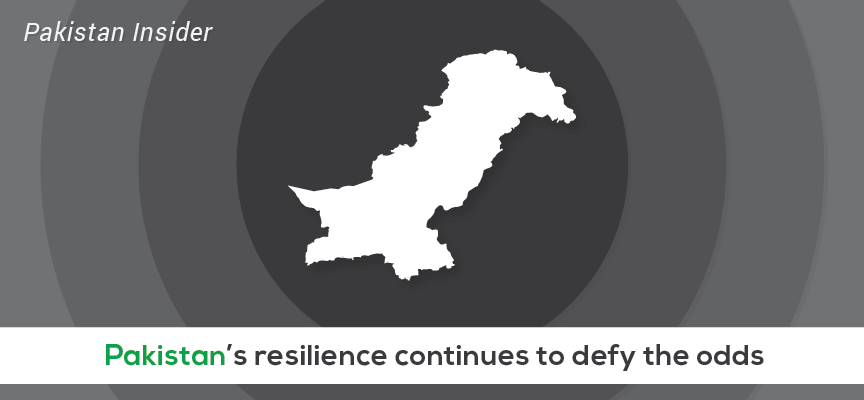
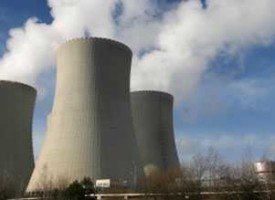
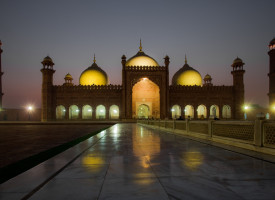
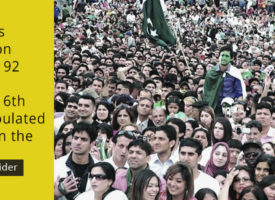
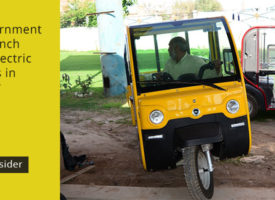
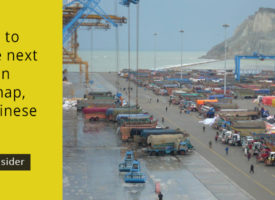

Thank you for this jaw dropping feast, a true nationalist like me can’t ask for anything more.. InshAllah we have & we will prevail for the greater good of our people & world around us.